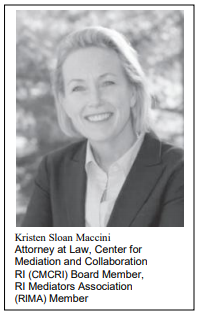 In one of the most thoughtful articles this reader has reviewed, Attorney Kristen Sloan Maccini lays out a context for lawyers to decide on the use of a mediator to serve their client's best interests and suggests, although "mediation can be very hard work for the parties and mediator, ... it has the capacity to achieve disputing parties’ goals with a comparatively small investment of time and money".
In one of the most thoughtful articles this reader has reviewed, Attorney Kristen Sloan Maccini lays out a context for lawyers to decide on the use of a mediator to serve their client's best interests and suggests, although "mediation can be very hard work for the parties and mediator, ... it has the capacity to achieve disputing parties’ goals with a comparatively small investment of time and money".
The Article appeared in RI Bar Journal January/February 2017, and in it she points out that "some lawyers believe mediation is the same thing as case settlement. This is not true, although case settlement often results from successful mediation".
The article presents some background and recommends 4 questions that may be helpful when considering mediation on behalf of your clients:
"1. Are you willing to work from an exploration of ultimate interests rather than entrenched positions?
2. Are you confident of your client’s ability to articulate those interests?
3. Can you establish a role for yourself that supports this process?
4. Are you willing to accept that there is no single truthful or right outcome?"
If you have considered these questions and respond mostly in the affirmative, you may wish to speak to a mediator about how he/she may be able to help you and your clients.
"A skilled mediator can manage the process such that parties move away from entrenched positions and become able to articulate their underlying interests, needs and priorities, and eventually, move towards a jointly acceptable resolution."
Kristen Sloan Maccini
If trust in a mediator is an issue for you or your client, consider that Bernard Mayer, a leader in the field on conflict resolution, believes that “mediators change the dynamic of the conflict in four ways:”
“First, mediators bring a different structure to the conflict. People will present their cases differently in front of a third party and mediators usually set a structure for communication, giving each party time to talk.
Second, mediators bring their commitment, vision and humanity to the interaction. Mediators have faith in mediation as a form of conflict resolution and their optimism that an agreement can be made affects the process.
Third, mediators bring sets of skills. Since mediators deal with conflict daily, they learn skills such as reframing and analysis to identify issues and options. This often has a comforting effect on the parties involved.
Fourth, mediators bring sets of values and ethics. This helps set a foundation that hopefully brings trust, respect and comfort to the parties and the process.”
The full Article is available on-line at
"When Is Mediation a Good Choice for Your Client"
(reprinted with permission from The RI Bar Association)
Rhode Island Bar Journal January/February 2017